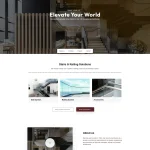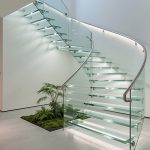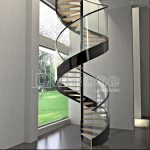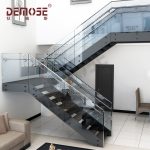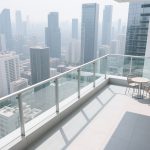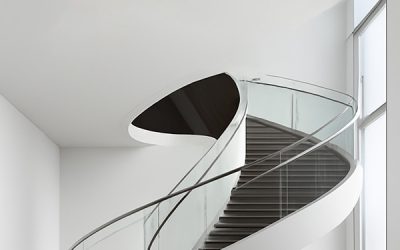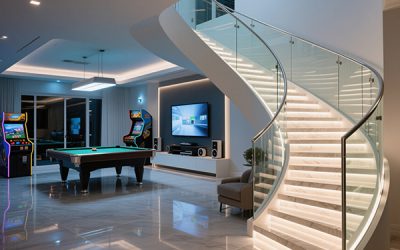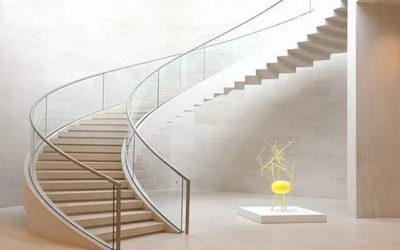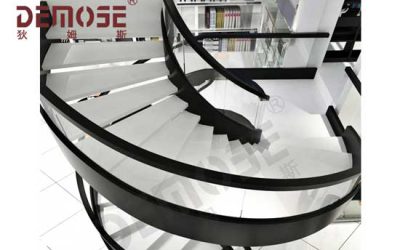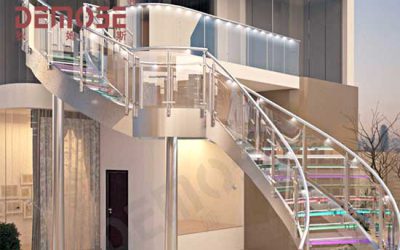Original Title: Comprehensive Analysis of Custom Staircase Costs: Regional Variations, Materials, and Long-Term Value (Adapted for North American and European Markets)
Custom staircases, as critical architectural elements connecting multi-level spaces, require careful cost evaluation. Based on industry data from leading manufacturers and market trends in the U.S. and Europe, this article provides a detailed breakdown of pricing factors, regional variations, and strategic purchasing advice.

I. Material Selection: Core Cost Determinants
Material choices drive 60–75% of total staircase expenses in Western markets:
1. Steel Stairs:
- Standard galvanized steel stairs: $150–$200/sf (Los Angeles, Berlin).
- Custom spiral designs with laser-cut patterns: $400–$600/sf (New York, Milan).
2. Solid Wood Stairs:
- Red Oak (U.S. sourced): $300–$500/sf for prefabricated units.
- Premium European Walnut/Cherokee Cherry: $800–$1,200/sf (luxury estates in Beverly Hills, Swiss Alps).
3. Glass Stairs:
- Tempered glass treads with stainless steel supports: $250–$400/sf (common in modern lofts, Chicago).
- Curved laminated glass with LED integration: $1,500–$2,500/sf (high-end retail spaces, Paris).
4. Natural Stone Stairs:
- Carrara Marble (Italy): $350–$700/sf (standard residential).
- Exotic stones like Calacatta Oro: $1,000–$1,800/sf (custom villas, Miami).
5. Hybrid Designs:
- Steel-wood combinations: $200–$350/sf (balanced for mid-range budgets).

II. Design Complexity & Compliance Costs
1. Structural Requirements:
- Straight-run stairs: 15–20% cheaper than spiral or cantilevered designs.
- Code compliance (e.g., OSHA, EU Building Standards): Adds $50–$150/sf for fire-resistant materials or ADA-compliant handrails.
2. Aesthetic Upgrades:
- CNC-carved wood balusters: +$80–$120/sf (artisan workshops in Tuscany).
- Forged iron railings: +$100–$200/sf (historic renovations, Boston).
III. Regional Price Variations
1. High-Cost Urban Centers:
- New York/San Francisco: 25–40% pricier than national averages due to labor and permit fees.
- Example: A prefab oak staircase costs $450/sf in NYC vs. $320/sf in Atlanta.
2. Manufacturing Hubs:
- Germany’s Ruhr Valley: Steel stairs at $130–$180/sf (benefiting from local steel mills).
- Northern Italy (Carrara region): Marble stairs 20% cheaper than imports.
3. Suburban/Rural Markets:
- DIY kits (e.g., IKEA, Home Depot): $100–$250/sf (popular in U.S. Midwest).
- Local timber utilization (e.g., Canadian Douglas Fir): Reduces costs by 30%.

IV. Brand Premiums & Installation Strategies
1. Luxury Brands:
- MOBO Stairs (U.S.), Artisan Staircraft (UK): 20–35% markup for bespoke designs and 10-year warranties.
2. Installation Models:
- Turnkey services: $500–$1,200/sf (includes design, materials, labor).
- Self-installation: Saves 15–25% but requires technical expertise.
V. Hidden Costs & Long-Term Value
1. Trade Policy Impacts:
- U.S.-EU tariffs on hardwood imports (e.g., Brazilian Rosewood): Increased costs by 18–22% since 2024.
2. Maintenance:
- Annual wood refinishing: $8–$15/sf (varies by climate).
- Stone sealing (quartzite): $5–$10/sf/year.
3. Energy Efficiency:
- Glass stairs with smart lighting: Adds $200–$500 in annual electricity costs.

Strategic Recommendations for Western Buyers:
- Opt for regional materials (e.g., Appalachian Oak in the U.S., Portuguese Limestone in Europe) to reduce logistics costs.
- Prioritize modular designs for future adaptability (e.g., adding smart sensors or changing railings).
- Consult local contractors for tax incentives on eco-friendly materials (common in California, Scandinavia).
By integrating these insights, homeowners and architects can navigate the custom staircase market with precision, balancing aesthetics, compliance, and budget.
References
- Trade tariffs impacting material costs (2025).
- DIY and hybrid staircase pricing (U.S./Europe).
- Stone staircase maintenance and regional sourcing.
- Brand premiums and luxury material trends.
- Compliance and lifecycle cost analysis.
